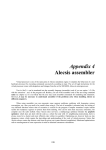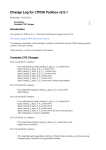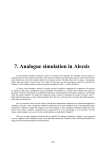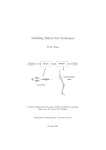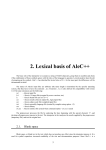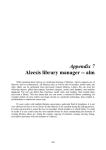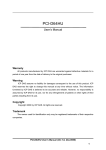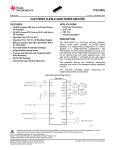Download Appendix 2 Alecsis standard libraries
Transcript
Appendix 2
Alecsis standard libraries
In this Appendix, only headers of standard libraries. These headers are included using included command. In
headers, all declarations are given. All definitions (modules, functions, etc.) mentioned in the headers are in one file.
For instance, header alec.h corresponds to library alec.ao, referenced as library alec.
Only some of the files that are stored in directory alecsis/include are given here. In future issues of
this Manual, we will give the most important headers specific for digital simulation, too.
Files are given in alphabetical order:
A2.1 alec.h
This is a standard library containing all main definitions and declarations needed. The header is in the
standard place (directory alecsis/include) under the name alec.h, and the library body is in the file alec.ao
(directory alecsis/lib). Header file heeds to be included using include command. Library alec need
not to be given explicitely using '-l' option or library command, as it is standard library.
The content of the header file is following:
/*
*
*
*
*
Faculty of Electronic Engineering Nis
Alecsis 2 hybrid simulator library header file
Library: alec
These declarations are not a must, but compiler will complain
162
Appendix 2. Alecsis standard libraries
* about parameters for functions listed below.
*
*/
#ifndef _ALEC_INCLUDED
# define _ALEC_INCLUDED
#
#
#
ifndef NULL
define NULL (0)
endif /* NULL */
#
#
#
ifndef EOF
define EOF (-1)
endif /* EOF */
# ifndef MAX
# define MAX(_x, _y) ((_x)>(_y) ? (_x) : (_y))
# endif /* MAX */
# ifndef MIN
# define MIN(_x, _y) ((_x)<(_y) ? (_x) : (_y))
# endif /* MIN */
# define cout stdout
# define cin stdin
# define cerr stderr
typedef struct {
int __cnt;
char *__ptr;
char *__base;
int __flag;
char __file;
} FILE;
/* standard built-in function prototypes */
extern
extern
extern
extern
extern
extern
extern
extern
extern
extern
extern
extern
extern
extern
extern
extern
extern
extern
extern
extern
extern
extern
extern
extern
extern
extern
extern
int printf(const char *, ... );
int fprintf(FILE *, const char *, ...);
int sprintf(char *, const char *, ...);
int fputc(char, FILE *);
int putc(char, FILE *);
int putchar(char);
char fgetc(FILE *);
char getc(FILE *);
char *gets(char *);
char *fgets(char *, int, FILE*);
char getchar(void);
int exit(int=0);
FILE *fopen(const char *, const char *);
int fclose(FILE *);
int fflush(FILE *);
int feof(FILE *);
int fseek(FILE *, int, int);
int ftell(FILE *);
int rewind(FILE *);
int fwrite(const void *, int, int, FILE *);
int fread(void *, int, int, FILE *);
void *calloc(int, int);
void *malloc(int);
void free(void *);
double node_value(int, int);
double drand(void);
void srand(int=1);
163
164
Alecsis 2.3 - User’s manual
extern
extern
extern
extern
extern
extern
extern
extern
extern
extern
double time_now(void);
void warning (const char *, int=0);
char *strcpy(char *, const char *);
int strcmp(const char *, const char *);
int strlen(const char *);
int get_info (int);
int get_info (int, char *);
int atoi(const char*);
double atof(const char*);
int system(const char*);
extern int set_bpoint(double);
/* standard Boolean choices */
# define True 1
# define False 0
/* alternative solution - Bool type */
typedef enum { false, true } Bool;
/* switch-like choices */
# define On 1
# define Off 0
/* Integration method choices */
# define None
0
# define EulerBackward 1
# define Gear2
2
/* Matrix renumeration options */
// # define None 0
# define Fast
1
# define Best
2
# define Frontal 3
/* dcon choices */
# define Initial 1
# define Always 2
/* get_info selection
# define CurrentPath
# define ParentPath
# define CurrentLevel
indx */
0
1
2
/* the most common implicit aliases */
implicit {
resistor
r;
capacitor c;
inductor
l;
vgen
v;
cgen
i;
mosfet
m;
bjt
q;
jfet
j;
diode
d;
switch
s;
};
/* pulse generator defined as a module */
module pulse (n1, n2) action (
double vhi,
double tr,
double vlo,
// high level
// rise delay
// low level
Appendix 2. Alecsis standard libraries
double
double
double
double
);
165
twl,
tf=0,
twh=0,
td=0
//
//
//
//
high level pulse width
fall delay
low level pulse width
start delay time
# ifndef _BIT_INCLUDED
#
include <bit.h>
# endif /* _BIT_INCLUDED */
/* overloaded << and >> - C++ style I/O */
FILE
FILE
FILE
FILE
*operator<<
*operator<<
*operator<<
*operator<<
(FILE
(FILE
(FILE
(FILE
*fp,
*fp,
*fp,
*fp,
int i);
double d);
const char *s);
char c);
FILE *operator>> (FILE *fp, char &c);
#endif /* _ALEC_INCLUDED */
This library contains prototypes of all intrinsic functions of general usage. The rest of C functions (except the
mathematical) are not implemented and cannot be called.
Command implicit, used in this file, gives possibility to use Alecsis similarly as SPICE.
We realized trapezoidal voltage generator as a module - its declaration is given above.
Beside standard C functions, alec.h contains a prototype of function warning, that is specific for
simulaiton, and is therefore not a standard C-function. You can use this function to print information of place, time
and context (the process, current component, etc.) during the execution. If the argument differs from 0, the
simulator stops the execution, otherwise the simulation continues.
A2.2. ctype.h
This is not a real library since it has only the header file - there is no file named ctype.ao. This library
contains the definitions of macros for work with characters:
#ifndef _CTYPE_INCLUDED
# define _CTYPE_INCLUDED
#
#
#
#
#
#
#
define
define
define
define
define
define
define
_U
_L
_N
_S
_P
_C
_B
01
02
04
010
020
040
0100
extern const char __ctype[];
extern const char __upshift[];
extern const char __downshift[];
#
#
#
#
#
#
define
define
define
define
define
define
isalpha(__c)
isupper(__c)
islower(__c)
isdigit(__c)
isalnum(__c)
isspace(__c)
(__ctype[__c]&(_U|_L))
(__ctype[__c]&_U)
(__ctype[__c]&_L)
(__ctype[__c]&_N)
(__ctype[__c]&(_U|_L|_N))
(__ctype[__c]&_S)
166
Alecsis 2.3 - User’s manual
#
#
#
#
define
define
define
define
ispunct(__c)
isprint(__c)
isgraph(__c)
iscntrl(__c)
(__ctype[__c]&_P)
(__ctype[__c]&(_P|_U|_L|_N|_B))
(__ctype[__c]&(_P|_U|_L|_N))
(__ctype[__c]&_C)
#
#
#
#
define
define
define
define
isascii(__c)
toupper(__c)
tolower(__c)
toascii(__c)
((__c) <= 0177)
((__upshift)[__c])
((__downshift)[__c])
((__c))
#endif
A2.3. bit.h
This file contains only declarations, while the definitions are in the library alec. This is the elementary
system of state bit containing '0' and '1' - logic zero and one, as well as the functions for overload of
elementary operators:
/*
* Faculty of Electronic Engineering Nis
* Alecsis 2.0 hybrid simulator library header file
* Library: alec
* Content: predefined two-valued logic system
*/
#ifndef _BIT_INCLUDED
# define _BIT_INCLUDED
typedef enum { '0', '1', ' '=void, '_' = void } bit;
/* overloaded logical operators for type "bit" */
extern bit operator~ (bit);
extern bit operator& (bit, bit);
extern bit operator| (bit, bit);
extern bit operator^ (bit, bit);
extern bit operator~& (bit, bit);
extern bit operator~| (bit, bit);
#endif
A2.4. gnulib.h
Functions declared here are used for on-line viewing of simulation results. They enable inter-process
communication with program gnuplot, that is used for viewing of simuation results. Function bodies are in
library gnulib, that is to be appended using library command or '-l' command option.
#ifndef _GNULIB_INCLUDED
# define _GNULIB_INCLUDED
#include <alec.h>
#include <unistd.h>
typedef enum { Lines, Points, LinesPoints, Impulses } LineStyle;
struct TraceList {
char *name;
int channel;
LineStyle lst;
Appendix 2. Alecsis standard libraries
167
struct TraceList *next;
};
typedef enum { CallGnu, Close } ExitStyle;
class gnu {
protected:
char *gnufile;
char *title;
FILE *fp;
int ntraces, nchannels;
LineStyle line_style;
TraceList *traceh, *tracet;
public:
gnu (const char* ="gnu.dat", const char* = "Alecsis results");
~gnu();
set_line_style(LineStyle);
add_trace(const char*, LineStyle = Lines, int = 1);
add_traces (const char*, ...);
add_data(double, Bool);
update (double, ...);
close_data ( ExitStyle, const char *geom="" );
report();
};
struct ResultBuffer {
double time;
double *values;
struct ResultBuffer *next;
};
class GnuOnLine: public gnu {
protected:
double tstop, update_period;
double tprint, last_time;
double vmin, vmax;
double cmin, cmax;
Bool channel_open, first_update;
int channel[2];
ResultBuffer *rbh, *rbt;
char *plot_mess;
create_plot_mess();
initialize();
flush_results();
tell_gnu(const char*);
set_value_margins();
public:
GnuOnLine (const char* ="gnu.dat",
const char* = "Alecsis results");
~GnuOnLine ();
time_frame(double, double, double=0.0);
value_frame (double, double);
open_channel (const char* ="");
open_channel (double, double, double, double,
double = 0.0, const char* = "");
send_data (double, ...);
main_loop();
};
#endif
The most appropriate way to explain these functions is to give an example. Here is an ring oscillator
description, where CMOS inverter is used as ring element. This inverter is cloned using clone command in an
ring of inverters (5 inverters in our example).
168
Alecsis 2.3 - User’s manual
/***************************************************************/
spice {
# include "omos.mod"
}
# include <alec.h>
#include <gnulib.h>
library gnulib;
/***************************************************************/
/* define analog inverter as a subcircuit */
module inverter ( In, Out, vdd, vss ) {
mup (Out, In, vdd, vdd){ model=pomos;l=5u; w=35u;ad=as=170p;
pd=ps=50u;};
mdwn(Out, In, vss, vss){ model=nomos;l=5u; w=10u;ad=as=50p;
pd=ps=35u;};
}
/***************************************************************/
module ring (node vdd, vss; node nodes[]) {
inverter inv;
action structural (int nring) {
int i;
for (i=0; i<nring; i++) {
if (i==nring-1)
clone inv [i] (nodes[0], nodes[i], vdd, vss);
else
clone inv [i] (nodes[i+1], nodes[i], vdd, vss);
}
}
}
/***************************************************************/
#define Period 50ns
root module ring_oscilator () {
ring rn;
vgen vdd;
node tmp[5] <- { 0.5v, 4.5v, 0.5v, 4.5v, 0.5v };
vdd (Vdd, 0) 5v;
rn (Vdd, 0, tmp) action (5);
timing { tstop = Period; a_step = a_stepmin = Period/200; }
out { node
node
node
node
node
tmp[0];
tmp[1];
tmp[2];
tmp[3];
tmp[4]; }
#ifdef GNU
action {
static GnuOnLine gp ("ring", "Ring oscillator");
process initial {
gp.add_traces("tmp0", "tmp1", "tmp2", "tmp3", "tmp4", 0);
gp.time_frame(Period, Period/100);
gp.value_frame(0v, 5v);
gp.open_channel();
}
process post_moment {
gp.send_data(tmp[0], tmp[1], tmp[2], tmp[3], tmp[4]);
}
process final {
gp.main_loop();
Appendix 2. Alecsis standard libraries
169
}
}
#endif
}
/*************************************************************/
Usage of gnulib functions are under preprocessor option
# ifdef GNU
so they will be activated if Alecsis is invoked using:
alec -DGNU ring
where ring.ac is the name of the file listed above.
Firstly, an instance of class GnuOnLine with name gp is declared. Constructor receives two parameters
(both have default values). First is the file name, used to store waveform data, in this example ring.dat
(extension '.dat' is added to the given name). The second parameter is waveform title, to appear above the
graphics.
Class method add_traces is invoked in process initial. It gives the number of waveforms to
be traced, and their names. This method is realized as the function with variable name of arguments, and the list of
arguments has to be finished with 0. All waveforms are drawn on one graphics, i.e. with one y-axis.
Method time_frame gives the last time point for x-axis (the first time point is assumed to be 0), and the
time step for waveform updating. Method value_frame gives initial range for y-axis scale (min and max). It is
to be noted that y-axis range will be automatically updated during the simulation, as we usually do not know range
of our simulation results in advance. However, x-axis cannot be updated, so arguments to time_frame must be
correct.
Method open_channel opens the communication channel with gnuplot.
In the process post_moment, method send_data is used. It is invoked as post_moment,
since simulation results can be sent after given time instant is solved. The number of arguments has to agree with
number of non-zero arguments of add_traces.
In the process final, function main_loop is invoked. Without this function, gnuplot will close the
drawing when the simulation is finished. Function main_loop leave program gnuplot active and gives you
normal gnuplot prompt, so you can analyse the waveforms, create different output formats, etc., when the
simulation is finished.
Class GnuOnLine can be used for all standard simulation problems. However, we have used Alecsis to
solve partial differential equations (simulation of micromechanical sensors), and have also created on-line viewing
for spatial 3D drawings. Class GnuOnLine was used there as a base class to create derived classes for specific
problems.
A2.5. math.h
We implemented all mathematics functions as instructions of virtual processor of simulation, so their
execution does not require including this header nor appending of a library body. The following declarations are
given so you can see what was implemented, and what was not:
/*****************************************************************
* This file contains prototype declarations for ALECSIS2.0
* built-in math functions. Since they really work as
* instructions, the declarations are necessary just that compiler
170
Alecsis 2.3 - User’s manual
* does not complain about arguments when invoked with -O
* (optimizer) option. The simulator works O.K. without this file.
****************************************************************/
#ifndef MATH_INCLUDED
# define MATH_INCLUDED
extern
extern
extern
extern
extern
extern
extern
extern
extern
extern
extern
extern
extern
extern
extern
extern
extern
extern
double
double
double
double
double
double
double
double
double
double
double
double
double
double
double
double
double
double
acos(double);
asin(double);
atan(double);
atan2(double, double);
cos(double);
sin(double);
tan(double);
cosh(double);
sinh(double);
tanh(double);
exp(double);
log(double);
log10(double);
pow(double, double);
sqrt(double);
ceil(double);
fabs(double);
floor(double);
extern int abs(int);
// These constants may be of some help in modelling
# define
# define
# define
# define
# define
# define
# define
# define
# define
# define
# define
# define
# define
#endif
M_E
M_LOG2E
M_LOG10E
M_LN2
M_LN10
M_PI
M_PI_2
M_PI_4
M_1_PI
M_2_PI
M_2_SQRTPI
M_SQRT2
M_SQRT1_2
2.7182818284590452354
1.4426950408889634074
0.43429448190325182765
0.69314718055994530942
2.30258509299404568402
3.14159265358979323846
1.57079632679489661923
0.78539816339744830962
0.31830988618379067154
0.63661977236758134308
1.12837916709551257390
1.41421356237309504880
0.70710678118654752440
A2.6. unistd.h
An equivalent of UNIX unistd.h file. There is no appropriate library. Here are declarations of functions
for forking and pipelining, used to enable simultaneous simulation and viewing of results (see section on
gnulib.h).
#ifndef _UNISTD_INCLUDED
# define _UNISTD_INCLUDED
/*
* unistd.h
* symbolic constants and structures which are used
* for support of the /usr/group standard.
*
*/
Appendix 2. Alecsis standard libraries
#
#
#
171
ifndef NULL
define NULL 0
endif
# ifndef R_OK
/* Symbolic constants for the "access" function: */
#
define R_OK 4
#
define W_OK 2
#
define X_OK 1
#
define F_OK 0
# endif
/*
#
#
#
#
#
#
Symbolic constants for the "lseek" function: */
ifndef SEEK_SET
define SEEK_SET
0
define SEEK_CUR
1
define SEEK_END
2
endif
include <time.h>
extern
extern
extern
extern
extern
extern
extern
extern
extern
extern
int
int
int
int
int
int
int
int
int
int
close(int);
dup(int);
execl(const char *, const char *, ...);
execv(const char *, const char **);
pipe(int *);
read(int, char *, int);
write(int, const char *, int);
fork();
_wait();
select(int, int*, int*, int*, struct timeval*);
#endif
A2.7. varargs.h
Two macros for work with functions and action blocks with variable number of arguments (no library
body) are in the file varargs.h. Explanations of how to use them are in Chapter 4 for functions, and in Chapter
5 for action parameters. Meaning of definition of DWORD_ALIGNMENT is explained there, too.
#ifndef VARARGS_INCLUDED
# define VARARGS_INCLUDED
//
ALECSIS2.0 Header file
//
(from standard C "varargs.h")
// Use __mode int for char and short types.
# define TYPE_DOUBLE 8
# define DWORD_SIZE 8
# define va_start(__list, __par) (__list = ((char *) (&__par) +
sizeof(__par)))
# ifndef DWORD_ALIGNMENT
#
define va_arg(__list,__mode) ((__mode *)(__list += \
sizeof(__mode)))[-1]
# else /* DWORD_ALIGNMENT */
# define va_arg(__list,__mode) ((sizeof(__mode)==TYPE_DOUBLE &&
((int)__list%DWORD_SIZE) ) ?
((__mode *)(__list+=sizeof(__mode)+
(DWORD_SIZE-((int)__list%DWORD_SIZE))))
: ( (__mode *)(__list += sizeof(__mode)) ) )[-1]
\
\
\
\
172
Alecsis 2.3 - User’s manual
# endif /* DWORD_ALIGNMENT */
# endif /* VARARGS_INCLUDED */












